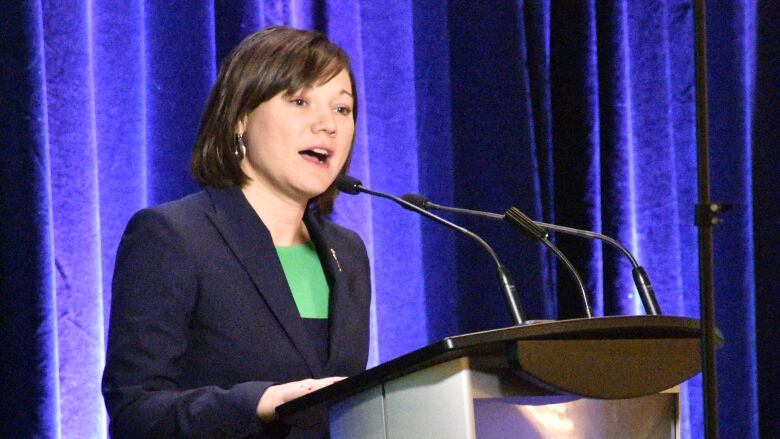Climate change denial is over, Alberta environment minister says
Shannon Phillips tells conference: 'Alberta must and will improve our environmental performance'

Alberta Environment Minister Shannon Phillips says a globally credible climate policy is important to the province's future, and now is the time to take action.
"There is a great appetite for action on climate change in our province, and the days of denial are over," Phillips said in a keynote address at a climate summit in Edmonton hosted by the Pembina Institute.
Phillips, appointedto the cabinet of NDP Premier Rachel Notley in May, is currently overseeing the development of aclimate change policy to take to the United Nations Climate Change conference in Paris this fall.
She noted that Alberta creates 37 per cent of all greenhouse gas emissions in Canada. That number is forecast to increase to 39 per cent by 2020.
Phillips said the effects of climate change can be seen in Alberta with wildfires,drought and shrinking glaciers.
- Alberta NDP will double carbon levy by 2017
- Hundreds turn up for Alberta's 1st climate change forum
- 500 attend Edmonton climate change forum
She told the conference that governments have been setting ambitious climate change goals for years without achieving them. She suggested that will change with her government.
Action is 'integral'
"Alberta needs globally credible climate change policies," she said. "Credibility doesn't come from pie-in-the-sky commitments. It comes from saying you are going to do something and then actually doing it."
Phillips saidthe people who say now is not the right time to deal with climate change never think there is a good time and are "turning a blind eye to reality."
"Action on the environment is integral to Alberta's economic future. In order to remain competitive, ensure market access for our energy products, Alberta must and will improve our environmental performance."
Topics include carbon pricing, how to move away from coal-fired electricitygeneration, innovative practices in the oilsands and how to increase energy efficiency.
ChiefAllan Adam of the AthabascaChipewyanFirst Nation told the conference about how dropping water levels are having an effect on his traditional land.
He told reporters he was optimistic about working with the new NDP government, but suggested they don't really have a choice at this point.
"Right now the Alberta government is being forced to the table," he said. "They have no choice to deal with this ever-growing problem. If we don't deal with it, and we don't sit down and talk with each other, it's only going to increase."
Bruce Nilles, senior campaign director with the Sierra Club's Beyond Coal Campaign, told the conference the effects of climate change are having an impact on health and insurance rates.
He said Alberta has to move away from using coal-fired power plants.
"Coal-fired power plants are really one of the worst public health menaces we have," he said. "So there's a huge opportunity to address public health concerns, climate concerns and reallydiversify how electricity is produced in Alberta."
'Pretty clear'
Nicholas Rivers, the Canada Research chair for climate change and energy policy at the University of Ottawa, said Alberta's biggest challenge is convincing the rest of the world that it has a meaningful climate change policy.
Many people don't understand what theprovince's current rules the Specified Gas Emitters Regulation (SGER) actually are. He said the province should either do a better job communicating or change what it does.
"Something that Alberta could do to get the buy-in from peopleoutside of the province that it was really doing meaningful action on climate change would [be to] transition to something that has more international understanding, like a carbon tax or a cap-and-trade system."
Chris Severson-Baker, managing director of the Pembina Institute, said the forum is possible because the conversation on climate change in Alberta has become more open with the change in government.
"The government has been pretty clear that they're interested in hearing from all segments of civil society on a variety of issues, whereas in the past, the conversation aroundclimate change was not open," he said.
"It wasn't very transparent. There were few opportunities for environmental organizations to make representations directly to government in a public forum."
Phillips announced last summer thatlarge emitters will have to reduce the intensity of greenhouse gases by20 per cent in 2017 and carbon levies will double from $15 a tonne to $30 a tonne.
Last week, hundreds of Albertans attended public sessions in Edmonton and Calgary to provide input on the new strategy.












_(720p).jpg)


 OFFICIAL HD MUSIC VIDEO.jpg)
.jpg)



























































































